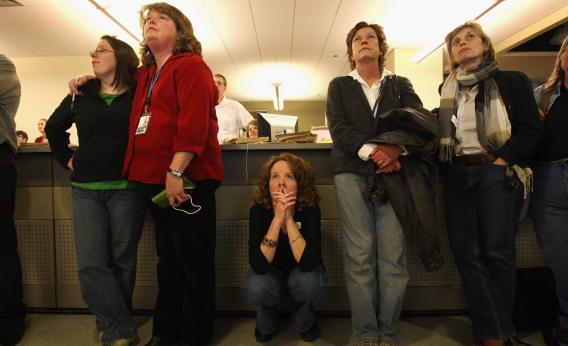When I graduated from college, I wanted to be a newspaper reporter. I had been editor in chief of my school paper at Stanford and formed some romantic notions about the role of a free press in a democratic society. But after a couple of internships at metropolitan dailies that were stuck in companywide hiring freezes, I spent my first six months on the job market unemployed. I was saved from destitution by a part-time stint as interim database manager at a local nonprofit that ran a chain of homeless shelters. At one point I was so hard up that the nonprofit’s managers took pity and lent me a mattress from one of the shelters.
Eventually I landed a job at a small but plucky daily paper in the Bay Area. It paid a little more than $30,000, in a city where the median price of a home was close to $1 million. After two years of hard work, heavy pressure, soul-deadening planning commission meetings, grisly crime scenes, and copious unpaid overtime, I got a small raise—only to lose it the next year when the company instituted across-the-board salary cuts. Then came buyouts, furloughs, and layoffs.
More than once I caught myself secretly hoping that I would be laid off, so I could at least collect unemployment while I went looking for a new career. Several times I covered labor disputes in which bus drivers and maintenance workers who made two to three times my salary were threatening to walk off the job unless their wages improved.
Still, I always figured there were worse gigs out there. I wasn’t risking my life on a daily basis, my co-workers were smart and friendly, and the work was generally interesting. But according to a new survey from CareerCast.com, I was wrong. “Newspaper reporter” ranks as the absolute worst job of 2013, edging “lumberjack” and “enlisted military personnel” for the distinction. “Actor,” “oil rig worker,” “dairy farmer,” “meter reader,” and “mail carrier” round out the bottom eight.
CareerCast.com cited “ever-shrinking newsrooms, dwindling budgets and competition from Internet businesses” among the factors making newspaper journalism jobs the nation’s worst. “Of course,” the report adds, “newspaper reporters have fared poorly in the Jobs Rated report for years due to the job’s high stress and tight deadlines, low pay, and requirement to work in all conditions to get the story.” The estimated revenue for the industry as a whole has dropped by half since 2006 and is still falling. Both the total number of jobs and the median salary—already an uninspiring $36,000—are expected to continue their decline in the coming years. Some of those jobs have migrated online, though the survey notes that “online reporter” jobs offer, on average, even lower wages and greater pressure to produce content in a hurry.
The only thing I can say in defense of my beleaguered profession is that, for a certain sort of person—a cynical yet stubbornly idealistic person who holds facts dear and simply can’t abide bullshit—all the trade-offs can be worth it, at least until the bills pile up so high that it’s no longer tenable. CareerCast.com’s methodology takes into account income, outlook, stress, and danger but ignores intangibles like autonomy, excitement, or fulfillment. Hence its ranking of “garbage collector” above “fashion designer” and “cashier” above “military general” on the full list of the year’s top 200 jobs. Still, this is hardly the first report to put journalism careers on the endangered species list. Earlier this month, Kiplinger’s “10 Worst Jobs for the Future” listed “journalism reporter” alongside “post office clerk” and “printing press technician.”
And there’s no denying the survey’s overarching takeaway, which is that the demand for workers with math and science skills is greater than ever, while writers are a dime a dozen. The No. 1 job, by CareerCast.com’s reckoning, is “actuary,” followed by “biomedical engineer,” “software engineer,” “audiologist,” and “financial planner.” The premium on health, technology, and data jobs accords with another recent list that ranked Facebook, Riverbed Technology, and M.D. Anderson Cancer Center among the best places to work in 2013.
In the 1970s, Ed Bruce sang, “Mammas, Don’t Let Your Babies Grow Up to Be Cowboys.” There were plenty of good reasons for that admonition, but one he didn’t mention was that cattle wrangling was a dying industry. Today, I suppose someone could write a similar song about print journalism. It’s a romantic calling, but one whose halcyon era has passed.
The Wall Street Journal has the full list of rankings. Here are the top and bottom five:
Best Jobs of 2013
- Actuary
- Biomedical Engineer
- Software Engineer
- Audiologist
- Financial Planner
- Reporter (Newspaper)
- Lumberjack
- Enlisted Military Personnel
- Actor
- Oil Rig Worker
